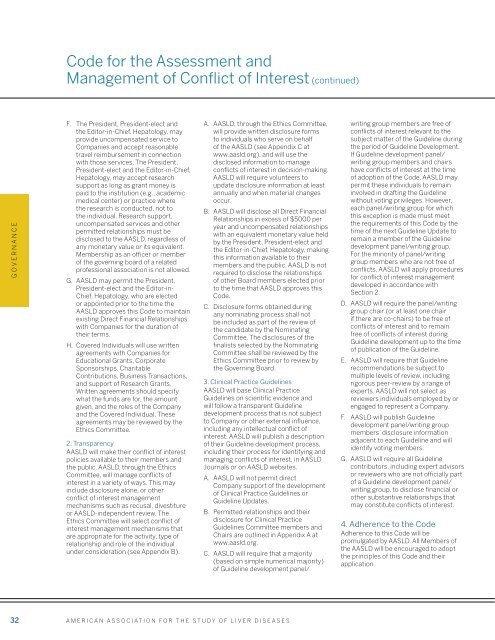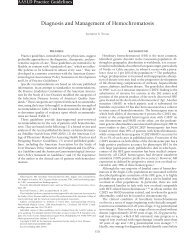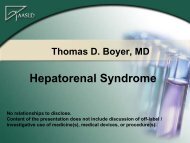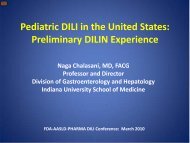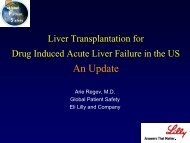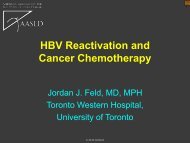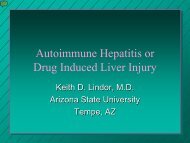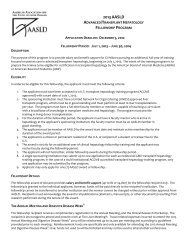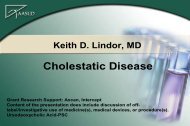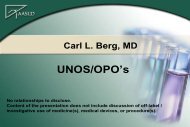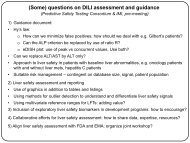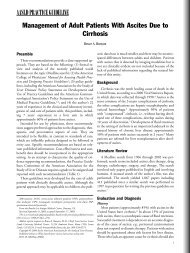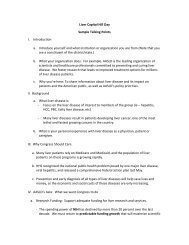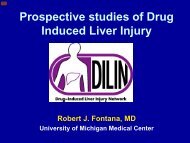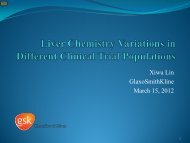2011 Annual Report - AASLD
2011 Annual Report - AASLD
2011 Annual Report - AASLD
You also want an ePaper? Increase the reach of your titles
YUMPU automatically turns print PDFs into web optimized ePapers that Google loves.
Code for the Assessment and<br />
Management of Conflict of Interest (continued)<br />
Governance<br />
F. The President, President-elect and<br />
the Editor-in-Chief, Hepatology, may<br />
provide uncompensated service to<br />
Companies and accept reasonable<br />
travel reimbursement in connection<br />
with those services. The President,<br />
President-elect and the Editor-in-Chief,<br />
Hepatology, may accept research<br />
support as long as grant money is<br />
paid to the institution (e.g., academic<br />
medical center) or practice where<br />
the research is conducted, not to<br />
the individual. Research support,<br />
uncompensated services and other<br />
permitted relationships must be<br />
disclosed to the <strong>AASLD</strong>, regardless of<br />
any monetary value or its equivalent.<br />
Membership as an officer or member<br />
of the governing board of a related<br />
professional association is not allowed.<br />
G. <strong>AASLD</strong> may permit the President,<br />
President-elect and the Editor-in-<br />
Chief, Hepatology, who are elected<br />
or appointed prior to the time the<br />
<strong>AASLD</strong> approves this Code to maintain<br />
existing Direct Financial Relationships<br />
with Companies for the duration of<br />
their terms.<br />
H. Covered Individuals will use written<br />
agreements with Companies for<br />
Educational Grants, Corporate<br />
Sponsorships, Charitable<br />
Contributions, Business Transactions,<br />
and support of Research Grants.<br />
Written agreements should specify<br />
what the funds are for, the amount<br />
given, and the roles of the Company<br />
and the Covered Individual. These<br />
agreements may be reviewed by the<br />
Ethics Committee.<br />
2. Transparency<br />
<strong>AASLD</strong> will make their conflict of interest<br />
policies available to their members and<br />
the public. <strong>AASLD</strong>, through the Ethics<br />
Committee, will manage conflicts of<br />
interest in a variety of ways. This may<br />
include disclosure alone, or other<br />
conflict of interest management<br />
mechanisms such as recusal, divestiture<br />
or <strong>AASLD</strong>-independent review. The<br />
Ethics Committee will select conflict of<br />
interest management mechanisms that<br />
are appropriate for the activity, type of<br />
relationship and role of the individual<br />
under consideration (see Appendix B).<br />
A. <strong>AASLD</strong>, through the Ethics Committee,<br />
will provide written disclosure forms<br />
to individuals who serve on behalf<br />
of the <strong>AASLD</strong> (see Appendix C at<br />
www.aasld.org), and will use the<br />
disclosed information to manage<br />
conflicts of interest in decision‐making.<br />
<strong>AASLD</strong> will require volunteers to<br />
update disclosure information at least<br />
annually and when material changes<br />
occur.<br />
B. <strong>AASLD</strong> will disclose all Direct Financial<br />
Relationships in excess of $5000 per<br />
year and uncompensated relationships<br />
with an equivalent monetary value held<br />
by the President, President-elect and<br />
the Editor-in-Chief, Hepatology, making<br />
this information available to their<br />
members and the public. <strong>AASLD</strong> is not<br />
required to disclose the relationships<br />
of other Board members elected prior<br />
to the time that <strong>AASLD</strong> approves this<br />
Code.<br />
C. Disclosure forms obtained during<br />
any nominating process shall not<br />
be included as part of the review of<br />
the candidate by the Nominating<br />
Committee. The disclosures of the<br />
finalists selected by the Nominating<br />
Committee shall be reviewed by the<br />
Ethics Committee prior to review by<br />
the Governing Board.<br />
3. Clinical Practice Guidelines<br />
<strong>AASLD</strong> will base Clinical Practice<br />
Guidelines on scientific evidence and<br />
will follow a transparent Guideline<br />
development process that is not subject<br />
to Company or other external influence,<br />
including any intellectual conflict of<br />
interest. <strong>AASLD</strong> will publish a description<br />
of their Guideline development process,<br />
including their process for identifying and<br />
managing conflicts of interest, in <strong>AASLD</strong><br />
Journals or on <strong>AASLD</strong> websites.<br />
A. <strong>AASLD</strong> will not permit direct<br />
Company support of the development<br />
of Clinical Practice Guidelines or<br />
Guideline Updates.<br />
B. Permitted relationships and their<br />
disclosure for Clinical Practice<br />
Guidelines Committee members and<br />
Chairs are outlined in Appendix A at<br />
www.aasld.org.<br />
C. <strong>AASLD</strong> will require that a majority<br />
(based on simple numerical majority)<br />
of Guideline development panel/<br />
writing group members are free of<br />
conflicts of interest relevant to the<br />
subject matter of the Guideline during<br />
the period of Guideline Development.<br />
If Guideline development panel/<br />
writing group members and chairs<br />
have conflicts of interest at the time<br />
of adoption of the Code, <strong>AASLD</strong> may<br />
permit these individuals to remain<br />
involved in drafting the Guideline<br />
without voting privileges. However,<br />
each panel/writing group for which<br />
this exception is made must meet<br />
the requirements of this Code by the<br />
time of the next Guideline Update to<br />
remain a member of the Guideline<br />
development panel/writing group.<br />
For the minority of panel/writing<br />
group members who are not free of<br />
conflicts, <strong>AASLD</strong> will apply procedures<br />
for conflict of interest management<br />
developed in accordance with<br />
Section 2.<br />
D. <strong>AASLD</strong> will require the panel/writing<br />
group chair (or at least one chair<br />
if there are co‐chairs) to be free of<br />
conflicts of interest and to remain<br />
free of conflicts of interest during<br />
Guideline development up to the time<br />
of publication of the Guideline.<br />
E. <strong>AASLD</strong> will require that Guideline<br />
recommendations be subject to<br />
multiple levels of review, including<br />
rigorous peer‐review by a range of<br />
experts. <strong>AASLD</strong> will not select as<br />
reviewers individuals employed by or<br />
engaged to represent a Company.<br />
F. <strong>AASLD</strong> will publish Guideline<br />
development panel/writing group<br />
members’ disclosure information<br />
adjacent to each Guideline and will<br />
identify voting members.<br />
G. <strong>AASLD</strong> will require all Guideline<br />
contributors, including expert advisors<br />
or reviewers who are not officially part<br />
of a Guideline development panel/<br />
writing group, to disclose financial or<br />
other substantive relationships that<br />
may constitute conflicts of interest.<br />
4. Adherence to the Code<br />
Adherence to this Code will be<br />
promulgated by <strong>AASLD</strong>. All Members of<br />
the <strong>AASLD</strong> will be encouraged to adopt<br />
the principles of this Code and their<br />
application.<br />
32<br />
american association for the study of liver diseases


